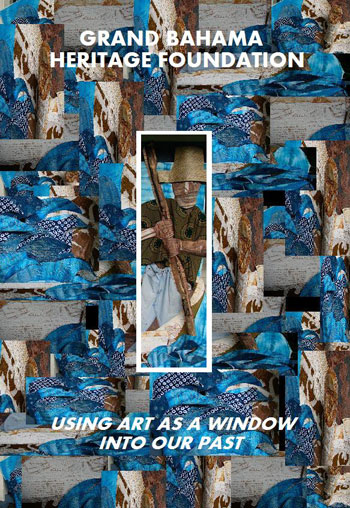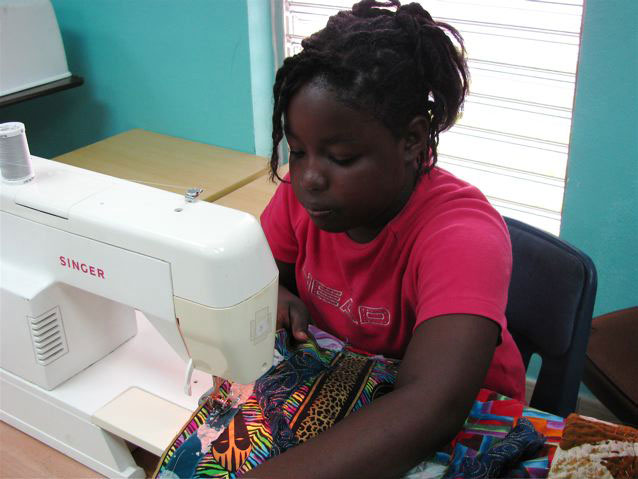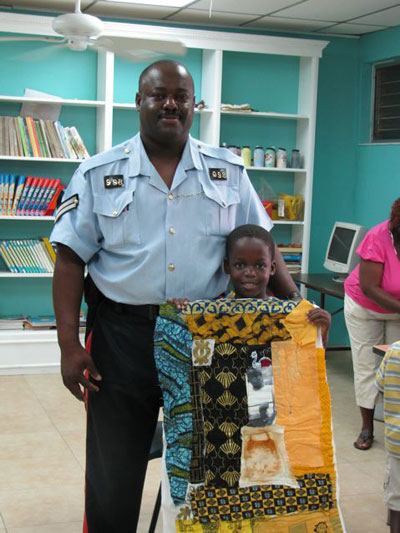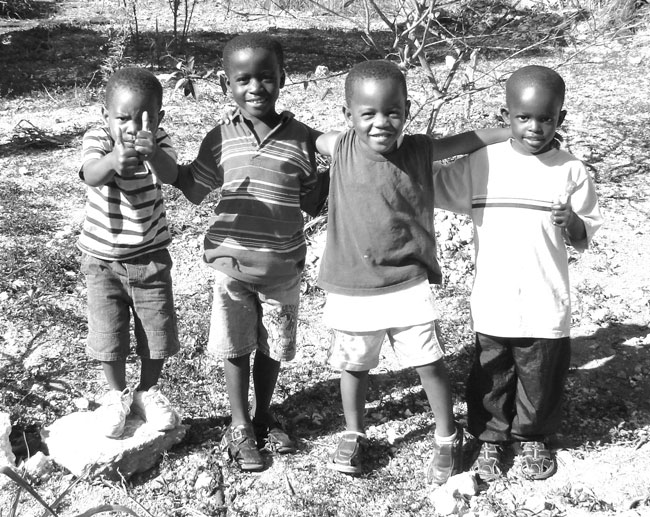
An abstract representation of a quilt by Artist in Residence Lauren Austin
|
The Freeport News - A Question of Faith: The Journey of
Freetown," an historical perspective told through fibre art and an
exhibition scheduled for November 12 in Grand Bahama, gives the
descendants of that old eastern settlement a quilt with enough warmth
to cover their expansive histories.
A project of the Grand Bahama Heritage Foundation, the exhibition
is the result of a seven-month artistic process, historical
documentation and cinematic recording of the history of the old
Freetown by the inhabitants of new Freetown. Once located by the coast,
all that is left of old Freetown is a cemetery called Infantview for
its first inhabitant – a baby – and the ruins of an old house. The
settlement was one of the first known communities of freed slaves on
the island.
Committed to using art to bring history to life in the absence of
artifacts, the GB Heritage Foundation embarked on the project, funded
by the Antiquities Monuments and Museums Corporation (AMMC) in 2008.
The group hosted artist Lauren Austin who taught participants from ages
four to 77 to make quilts that depicted their personal histories.
"We find that art is a window into the past, and we find that it's a
better way to show people history by using the arts," said Chantal
Bethel of the group's motto. An artist also, Bethel is Co-chair and
Co-Founder of the Foundation along with Laurie Tuchel, a community
organizer.

10 year old Elizabeth Roberts sewing her quilt during the workshop
|
Once a month, Austin facilitated the quilt-making among the group of
15 participants. Participants were asked to select the photographs they
would use in what would become Photo Memory Quilts. The photos were
printed on fabric. Additional pieces of dyed and painted fabric were
used to form the rest of the hand and machine-stitched quilts.
"Perhaps the most fascinating element of this day was listening to
participants tell why they had chosen the specific photos or artifacts
for their quilts," recounted Austin. "Invariably, their choice involved
not a specific day or event, but rather a person or representative
object that was very important to their daily life that had helped
shape or guide their lives and the lives of those around them. Several
stories involved the importance of individual family members to their
personal growth and upbringing...
"Our project helped community members to pass on their histories to
new generations in a vital and engaging way. The cross-generational
aspect of the Freetown History/Art Project was not only ideal to
achieve the project's objectives, but also an essential model for
similar projects to preserve the sense of identity and purpose of
future generations."
The multi-faceted project spurred research by Darius Williams, which
the Foundation sponsored. Marion Bethel served as writer for the
project and Dave Mackey filmed the entire process for a screening
during the exhibition. The Foundation also plans to produce a catalogue
of the exhibition and the artistic process for sale. The quilt will
become the property of the GB Heritage Foundation.

9 year old Ahamal Lightbourn displaying his finished quilt with his dad
|
The group, which has already acquired a few artifacts, plans ultimately to create a museum on the island.
The exhibition on November 12 is one of a series of events that the
Foundation has hosted since its establishment in 2003. That year the
founders were asked to put on an exhibition for the 30th Anniversary of
Independence. At that time artists donated paintings representing
heritage of the island to the future museum.
"We found out that people were really interested in the history of
Grand Bahama and we decided ... we can't stop, so we decided we're
going to continue and then we had to start working."
The Foundation's wide range of projects included participation in
the organization of Freeport's 50th Anniversary exhibit in 2005; an
historical exhibit on the Abaco Lumber Company in July 2006 at Arawak
Cay; "Artistic Expressions," a special exhibit by various GB Artists in
November 2006 and a March 2007 reading by award-winning Bahamian poet
Marion Bethel from her published work Hurricane of Desire.
Later in 2007, the Foundation commemorated the 200th Anniversary of
the abolition of the trans-Atlantic slave trade in the exhibition
"Freedom Call." In December of that year the group acquired artist
Antonius Roberts' "Sacred Women," a collection of 12 sculptures
representing the freed slaves of Freetown. In 2009, the Foundation
screened the "Artists of the Bahamas" documentary, directed by Karen
Arthur and Thomas Neuwirth, that features 11 of the country's leading
artists.
The GB Heritage Foundation became a registered non-profit
organization in accordance with the Commonwealth of The Bahamas Act in
2004. Its mission is "To research, explore and celebrate the history of
Grand Bahama Island through collection, preservation and exhibition of
historical objects."
Article SOURCE

Freetown children
|
